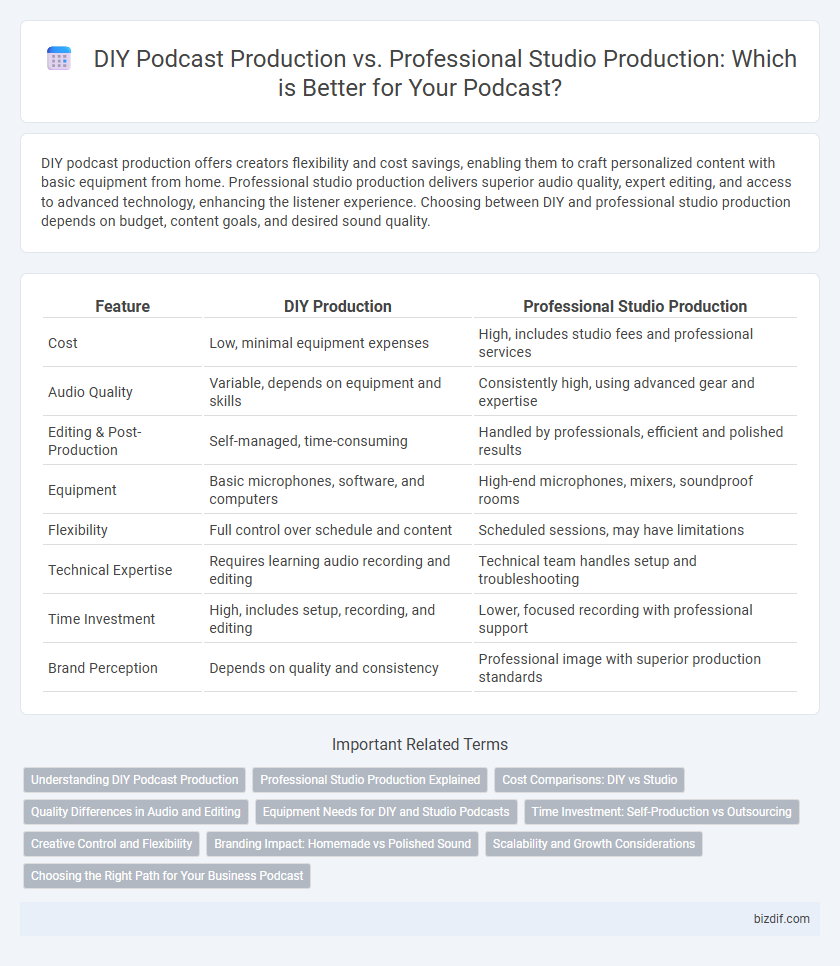DIY podcast production offers creators flexibility and cost savings, enabling them to craft personalized content with basic equipment from home. Professional studio production delivers superior audio quality, expert editing, and access to advanced technology, enhancing the listener experience. Choosing between DIY and professional studio production depends on budget, content goals, and desired sound quality.
Table of Comparison
| Feature | DIY Production | Professional Studio Production |
|---|---|---|
| Cost | Low, minimal equipment expenses | High, includes studio fees and professional services |
| Audio Quality | Variable, depends on equipment and skills | Consistently high, using advanced gear and expertise |
| Editing & Post-Production | Self-managed, time-consuming | Handled by professionals, efficient and polished results |
| Equipment | Basic microphones, software, and computers | High-end microphones, mixers, soundproof rooms |
| Flexibility | Full control over schedule and content | Scheduled sessions, may have limitations |
| Technical Expertise | Requires learning audio recording and editing | Technical team handles setup and troubleshooting |
| Time Investment | High, includes setup, recording, and editing | Lower, focused recording with professional support |
| Brand Perception | Depends on quality and consistency | Professional image with superior production standards |
Understanding DIY Podcast Production
DIY podcast production empowers creators to manage recording, editing, and publishing independently using accessible tools like USB microphones and free editing software such as Audacity or GarageBand. This approach lowers overhead costs and offers creative control but requires time investment and learning audio engineering basics to ensure sound quality and audience engagement. Understanding microphone placement, noise reduction, and consistent content scheduling are essential for successful DIY podcast production.
Professional Studio Production Explained
Professional studio production in podcasting ensures high-quality audio through advanced equipment such as soundproof rooms, high-end microphones, and mixing consoles. Experienced sound engineers handle post-production tasks like editing, noise reduction, and mastering to deliver crisp, polished episodes. This level of production enhances listener engagement by providing consistent clarity, balanced sound, and expertly crafted audio dynamics.
Cost Comparisons: DIY vs Studio
DIY podcast production significantly reduces costs, with basic equipment like microphones, headphones, and recording software ranging from $100 to $500. Professional studio production involves higher expenses, including hourly rental rates between $50 to $200, plus additional fees for technical support and post-production services. Budget-conscious podcasters can save thousands annually by opting for DIY setups, while studio recordings offer enhanced sound quality and expertise at a premium price.
Quality Differences in Audio and Editing
DIY podcast production often faces challenges in achieving studio-level audio clarity due to limited equipment and acoustic treatment, resulting in higher background noise and inconsistent sound levels. Professional studio production utilizes advanced microphones, soundproof environments, and skilled audio engineers to ensure crisp, balanced audio with seamless editing that enhances listener engagement. The difference in post-production techniques, such as noise reduction, equalization, and mastering, significantly impacts the overall sound quality and polish of the final podcast episode.
Equipment Needs for DIY and Studio Podcasts
DIY podcast production typically requires essential equipment such as a quality USB microphone, headphones, audio editing software, and a quiet recording space to achieve clear sound. Professional studio production involves advanced gear like multi-channel mixers, high-end condenser microphones, soundproofed rooms, and dedicated audio engineers for optimal sound quality. Investing in proper equipment tailored to the podcast's scale ensures consistent audio performance and listener engagement.
Time Investment: Self-Production vs Outsourcing
DIY podcast production demands significant time investment for recording, editing, and mastering episodes, often extending the total production timeline by several hours per episode. Professional studio production streamlines these processes, leveraging expert teams and advanced equipment to reduce turnaround time substantially. Outsourcing tasks such as audio editing and mixing allow podcasters to focus on content creation, resulting in more efficient episode release schedules and higher-quality output.
Creative Control and Flexibility
DIY podcast production offers maximum creative control and flexibility, allowing podcasters to experiment freely with format, content, and recording schedules. Professional studio production provides high-quality equipment and expert technical support, but often comes with stricter time constraints and less room for spontaneous creative changes. Balancing the DIY approach with professional resources can optimize both creative freedom and audio quality in podcasting.
Branding Impact: Homemade vs Polished Sound
DIY podcast production often results in a homemade sound that can feel authentic but risks appearing unpolished, potentially affecting brand credibility and listener trust. Professional studio production delivers a polished sound quality that enhances a podcast's branding by projecting professionalism and reliability, which can attract a broader audience. Consistent, high-quality audio reinforces brand identity and increases listener engagement, crucial for growth in competitive podcast markets.
Scalability and Growth Considerations
DIY podcast production offers flexibility and cost-efficiency ideal for solo creators and small teams, but may struggle to scale with increasing audience demands or complex content needs. Professional studio production provides advanced equipment, expert editing, and consistent quality that support scalability and accelerated podcast growth through enhanced listener experience and brand credibility. For sustainable expansion, balancing initial DIY efforts with gradual integration of professional services can optimize resource allocation and audience retention.
Choosing the Right Path for Your Business Podcast
Choosing between DIY production and professional studio production depends on your podcast's budget, quality expectations, and scalability goals. DIY production offers cost-effectiveness and creative control, ideal for startups and entrepreneurs aiming to maintain authenticity. Professional studios provide high-end audio quality, expert editing, and production efficiency, best suited for brands seeking polished content and strong market presence.
DIY Production vs Professional Studio Production Infographic

 bizdif.com
bizdif.com